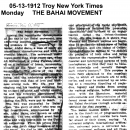Main menu
- ‘Abdu’l-Bahá’s Journey
- World Peace
- Stopping Racism in America
- Empowerment of Women
- More Principles...
- Prayer for America
The Bahá’í Movement
Among the remarkable developments of the day is the Bahá’í movement, now attracting especial attention because of the presence in this country of its leader, ‘Abdu’l-Bahá, a man of many extraordinary characteristics and with an eventful history. The movement really began more than sixty years ago, when Ali Mohammed, a young Persian, started as a reformer of Islam, announcing himself as the “Báb” or “gateway of knowledge.” The efforts of the Báb were directed to encouraging upright living, and the underlying principle of his system was that of love and kindness among men. His life was exemplary and his teaching elevating, but he aroused religious and official enmity, he and his followers encountered the bitterest persecution and thousands, including the Báb, were put to death.
The Báb was succeeded by Bahá’u’lláh, “the glory of God,” who was exiled from Persia, accompanied by his son, ‘Abdu’l-Bahá, also known as Abbas Effendi. The two endured great harm-ships and were imprisoned by the Turkish authorities. From his prison Bahá’u’lláh sent forth many messages of love and peace. He died in 1882. ‘Abdu’l-Bahá was kept in duress until the revolution of 1908, when the Young Turks set him free, after he had been in confinement forty years. It is this man who teaches peace and unity among nations. The Persian Educational Society, which has become deeply interested, sends forth much literature intended to correct misrepresentations that have been made owing to misunderstanding of the general principles of the Bahá’í movement. This literature includes the preamble, constitution and by-laws of an organization called the Orient-Occident Unity. By this means it is shown that Western and Eastern nations are beginning to realize the advantages of better acquaintance, and the object of Orient-Occident Unity as defined is “to remove the prejudice of both sides and bring together the representative business, industrial and intellectual persons of both hemispheres, so that they may be benefited materially and morally through each other’s contact.” This purpose is more fully explained in the constitution, to which all members are to subscribe, and may be summed up as aiming at a complete dispelling of prejudice, bigotry and dislike from among the various religions, better acquaintance with the literature, material achievements and characteristics of different races and the dissemination of the Bahá’í doctrines through schools established for that purpose.
The Bahá’í leaders assert that they are in the forefront of progressiveness, and in thought and morals have been far ahead of their times, saying: “A universal religion, international arbitration, universal peace, a universal language, universal suffrage and all those reforms which compose a universal civilization were unthought of by the world when, over half a century ago, these principles were first taught by the Bahá’ís.” The movement antagonizes none of the existing religious systems, readily recognizing the merits of each. But it professes to offer something far higher — that which, blending the good found in every religion, shall produce.









